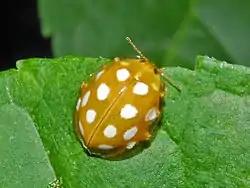| Halyzia | |
|---|---|
 | |
| Halyzia sedecimguttata | |
| Scientific classification | |
| Kingdom: | |
| Phylum: | |
| Class: | |
| Order: | |
| Family: | |
| Genus: | Halyzia Mulsant, 1846 |
Halyzia is a genus in the ladybird family, Coccinellidae. The Halyzia sedecimguttata is identified by its orange color and 14-16 spots on its back. Halyzia is concentrated in European deciduous forests. They can be found in the edges of woodlands or bushes.
Halyzia, like many insects has an egg stage, a larval stage, a pupa stage and an adult stage. Once the female lays her eggs, they will hatch in 4–10 days. Halyzia will molt many times before it becomes a full grown adult. Like moths, Halyzia is attracted to light. These Insects will be frequently found in moth traps.
Species
Species within this genus include:[1]
- Halyzia feae Gorham, 1895
- Halyzia nepalensis Canepari, 2003
- Halyzia sanscrita Mulsant, 1853
- Halyzia sedecimguttata (Linnaeus, 1758)
- Halyzia straminea (Hope in Gray, 1831)
- Halyzia tschitscherini Semenow, 1895
References
- https://www.wildlifetrusts.org/wildlife-explorer/invertebrates/beetles/orange-ladybird
- https://www.inaturalist.org/taxa/52881-Halyzia-sedecimguttata
- https://www.theguardian.com/environment/gallery/2013/jul/22/ladybird-species-harlequin-uk-insects
- https://www.ladybuglady.com/LadybugsFAQ.htm
This article is issued from Wikipedia. The text is licensed under Creative Commons - Attribution - Sharealike. Additional terms may apply for the media files.